When I walk through the gates, I expect the armed policeman stationed in the guard box to stop me, or the plain-clothed guy in there to at least give me a suspicious look. Neither happens and I stroll up on the red-and-black brick paving.
It’s a slight incline; not too taxing, just enough to make you lean forward and strain a bit. I get right up to the entrance of the building. It looks tall from a distance, when one takes in the Harare skyline, amongst the other tall buildings. But here, standing right at its base? It is imposing.
There is a brass plaque next to the entrance, as usual, stating which important official opened this important building on which important date. I run my eyes from the plaque, up the building, craning up until I feel a slight tweak in my neck.
In that moment, I realize that we, as a country, should have known how screwed we were, when the Eating Comrades erected a Head Quarters in the shape of a massive phallus – complete with a black cock at the top.
I beg your pardon; let me backtrack. I set out to do a bit of research this morning. Research on a musician … and his song. There was water coming out of the municipal taps this morning. So I managed to take a bath before leaving the house. Nice.
And so I took a stroll through the Avenues. The girls were already on the corners. 8 a.m. and they were pacing the street. I have always wondered who buys sex at eight o’clock in the morning. Someone does. Regularly. And so the girls are already in their stockings and short tight dresses … and while the employed drive and walk to work … they are already at work.
My musician is Mozambican. That’s what it says in a note on Amazon.com album page. I had always assumed he was Zimbabwean. The song is popular in Zimbabwe. But to float the mystery, he doesn’t “sing”. Meaning there are no actual words in the entire composition.
So there is no way of telling nationality from the language in the lyrics. It’s just him and an acoustic guitar … and acoustic guitars have no nationality.
The Mozambican Embassy is an exercise in minimalism. There is one counter, manned by one person, with one broken pen and no paper. And so, at her instruction, I follow her into another section of the building so she can ask for a blank sheet of paper for me to leave my details.
She speaks in lightly accented Shona. A Shona that could allow her to pass for a native. I have enquired about my musician and his song and after two minutes of misunderstanding and government employee annoyance, she has decided to “take my details” to forward on to “her boss”. Very encouraging.
Matias Xavier recorded and released a song in 1988. A lament. Samora Machel had died in a plane crash two years prior, on 19 October 1986. This song was in commemoration … and it captured the essence of grief. Collected, funneled, distilled … one note at a time. Grief on 7-inch single. Grief spinning at 78 rpm. A melancholy wail, shuffling and hissing wearily between sparse notes and pleading groans.
An emotion threading between guitar strings, through worn fingers, meeting its vocal doppelganger on a studio microphone, straining past the lump in Matias’s throat. Matias in a recording studio, draped in mourning garments … ashy sack cloths, bent over, tears streaming, pleading upwards to the deity of oppressed souls. It is a song beyond language and lyrical inconvenience.
In that brief but dizzying revolutionary fervour of post-colonial Zimbabwe … and the national camaraderie with Frelimo Mozambique, no words could have sufficed. Two years after the death of Samora Machel, a guitar-accompanied plea to the guardians of the souls of black folk.
A grainy, hollow recording, running a telegraph line from a slavery plantation in the American South to the wooden cabinet Tempest and Supersonic hi-fi’s and black-and-white television sets in living rooms of the post-colony. It peaked the Zimbabwean charts at Number 2 in August 1988.
And so I walk into the phallus;
“Ndipe I.D. … uri kuenda kupi?”
“Ku Commissariat.”
“Urikuda kuona ani ikoko?”
“Handizive kuti ndinoona ani. Ndakauya last week ndikanzi ndiende kunoona veko.”
“Ndezveyi?”
“Pane research yandirikuita maererano nerwumbo rwunoridzwa panoshaya magamba.”
“Unokuziva kwauri kuenda?”
“Aiwa.”
“Asi wamboti wakauya pano wani?”
“Ehe, ndakauya pano paReception asi vanhu veko vakanga vasipo.”
“Hoo … enda ku 7th Floor.”
Mozambique has departed much from the Marxist ideals of Cde Machel. Sporadic battles between the MNR or RENAMO still break out. There is significant capital investment driving infrastructural development. RENAMO has popular support in national politics. On one end, young boys are holding up captured live game for sale by the roadside, in Tete, a second bridge spanning the width of the Zambezi was commissioned.
Zimbabwe is less contradictory. For the last 27 years it has been that feeling you get when you step into a puddle of water … that moment when the cold wetness soaks your socks. On repeat.
Tormented Soul is now an echo from a past era. Souls are still drifting over Chimoio, Nyadzonia and disused mine shafts … but the torment is now.
Our souls need respite. Not an old song. Another worn and overused ratchet in a State toolbox pulled out on occasion to wind up spent emotions.
The Tormented Souls are now.

